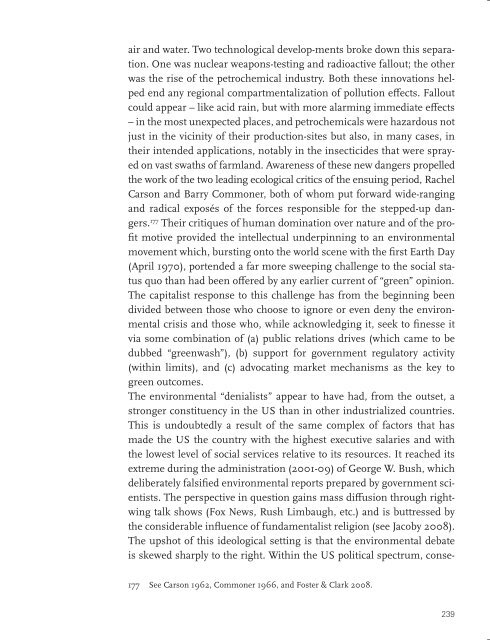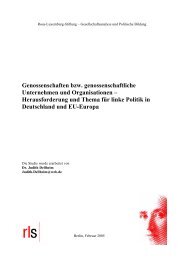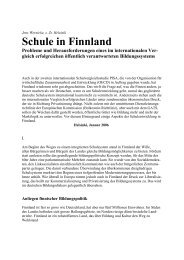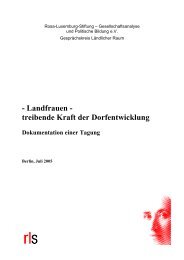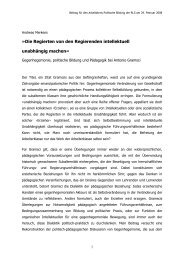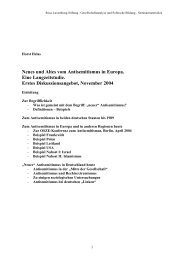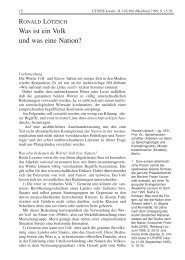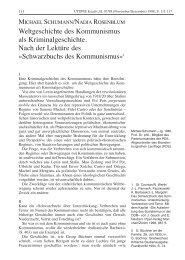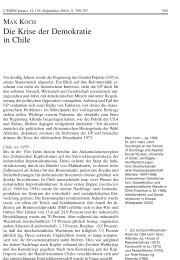Grünen Kapitalismus - Rosa-Luxemburg-Stiftung
Grünen Kapitalismus - Rosa-Luxemburg-Stiftung
Grünen Kapitalismus - Rosa-Luxemburg-Stiftung
Erfolgreiche ePaper selbst erstellen
Machen Sie aus Ihren PDF Publikationen ein blätterbares Flipbook mit unserer einzigartigen Google optimierten e-Paper Software.
air and water. Two technological develop-ments broke down this separation.<br />
One was nuclear weapons-testing and radioactive fallout; the other<br />
was the rise of the petrochemical industry. Both these innovations helped<br />
end any regional compartmentalization of pollution effects. Fallout<br />
could appear – like acid rain, but with more alarming immediate effects<br />
– in the most unexpected places, and petrochemicals were hazardous not<br />
just in the vicinity of their production-sites but also, in many cases, in<br />
their intended applications, notably in the insecticides that were sprayed<br />
on vast swaths of farmland. Awareness of these new dangers propelled<br />
the work of the two leading ecological critics of the ensuing period, Rachel<br />
Carson and Barry Commoner, both of whom put forward wide-ranging<br />
and radical exposés of the forces responsible for the stepped-up dangers.<br />
177 Their critiques of human domination over nature and of the profit<br />
motive provided the intellectual underpinning to an environmental<br />
movement which, bursting onto the world scene with the first Earth Day<br />
(April 1970), portended a far more sweeping challenge to the social status<br />
quo than had been offered by any earlier current of “green” opinion.<br />
The capitalist response to this challenge has from the beginning been<br />
divided between those who choose to ignore or even deny the environmental<br />
crisis and those who, while acknowledging it, seek to finesse it<br />
via some combination of (a) public relations drives (which came to be<br />
dubbed “greenwash”), (b) support for government regulatory activity<br />
(within limits), and (c) advocating market mechanisms as the key to<br />
green outcomes.<br />
The environmental “denialists” appear to have had, from the outset, a<br />
stronger constituency in the US than in other industrialized countries.<br />
This is undoubtedly a result of the same complex of factors that has<br />
made the US the country with the highest executive salaries and with<br />
the lowest level of social services relative to its resources. It reached its<br />
extreme during the administration (2001-09) of George W. Bush, which<br />
deliberately falsified environmental reports prepared by government scientists.<br />
The perspective in question gains mass diffusion through rightwing<br />
talk shows (Fox News, Rush Limbaugh, etc.) and is buttressed by<br />
the considerable influence of fundamentalist religion (see Jacoby 2008).<br />
The upshot of this ideological setting is that the environmental debate<br />
is skewed sharply to the right. Within the US political spectrum, conse-<br />
177 See Carson 1962, Commoner 1966, and Foster & Clark 2008.<br />
239


